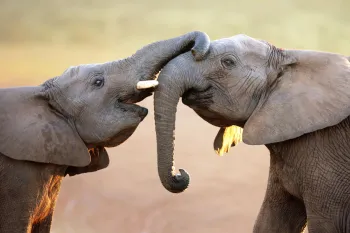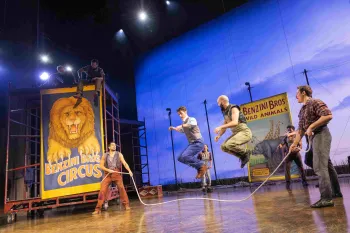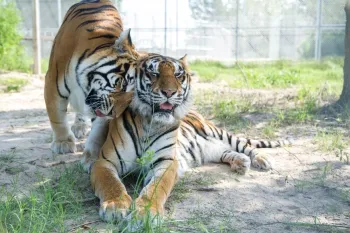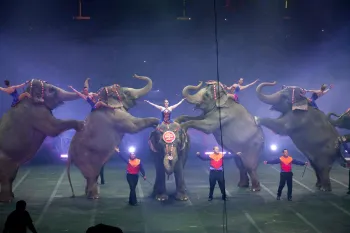Washington has banned the use of elephants, wild cats, bears and nonhuman primates in circuses and other traveling shows. The landmark legislation, sponsored by Sen. Marko Liias (D), passed with bipartisan support, and with Governor Bob Ferguson’s signature, Washington becomes the 12th state in the U.S. to enact restrictions on the use of wild animals in traveling exhibits and shows.
April 9, the date on which the Washington House of Representatives approved the measure now enacted into law, was just another day for two elderly elephants believed to be suffering from joint and mobility issues as they were forced to perform in the Jordan World Circus at the Benton County Fairgrounds in Kennewick. Each one in their 50s, they are living reminders of what our campaign to end animal acts is all about.
The two elephants, Viola and Isa, are owned by Carson & Barnes Circus, which has frequently been cited for animal welfare violations. Like all elephants currently used in circuses in the U.S., the two were captured from their wild homes in Asia as babies and consigned to decades of chaining, confinement and coerced performances.
Viola’s name might be familiar, because she has attempted on at least three occasions to break free from her captivity and the miseries of circus life. It happened most recently last year, when Viola escaped from her handlers in Butte, Montana, running through vehicle traffic and parking lots, endangering herself and others.
The law will have an immediate and lasting impact for elephants like Viola and Isa and other animals hauled into and around Washington state by Jordan World Circus, Culpepper & Merriweather Circus, and other exhibitors. There’s one less state willing to tolerate the pain, suffering and deprivation that their business models routinely impose on wild animals.
There is every reason to push these operations to end their callous and cruel treatment of animals. Culpepper & Merriweather, for example, carts big cats across the country day after day for a grueling tour that includes 200 or more stops a year. The circus typically performs in over a dozen cities in Washington every other year and currently travels with two geriatric tigers, named Solomon and Delilah, and two young lions, Wendell and Nelson.
The US Department of Agriculture previously suspended the company’s license after Solomon and Delilah, who are biological siblings, were allowed to breed during the offseason. Delilah gave birth while on tour, and within days, two of the inbred cubs died. The lone survivor was confiscated by the USDA a few months later and found to be underweight with a wound near his eye and skin abrasions caused by an ill-fitting harness.
Under the new law, businesses of this kind face a choice: Continue to entertain crowds with a modern, humane model, as Ringling Bros. and Barnum & Bailey Circus and UniverSoul Circus have successfully done, or skip Washington altogether.
In the last year alone, three states—Maryland, Massachusetts and now Washington—have passed legislation to restrict traveling wild animal acts. These wins are hard-fought, and in cases like Massachusetts can take decades to achieve, but the momentum is on our side, and it continues to grow. The New York Senate has passed a similar bill in its current session to prohibit the use of nonhuman primates, bears, wild cats, kangaroos and wallabies in traveling shows, augmenting the state’s existing law, which bans the use of elephants in entertainment acts.
Nearly 200 localities have restricted wildlife acts, too, and we’re working to grow that number.
We’re also pushing hard for reform when it comes to local Shrine chapters across the US, many of which host circuses each year. You can help by urging Shriners International to prohibit local chapters from using sensitive wild animals in their circuses.
With every law enacted, we’re moving closer to a world in which wild animals live free from the many cruelties they have had to endure in circuses and traveling acts. These legislative victories are shrinking the map for animal cruelty, and making a difference for Viola, Isa and countless other animals in similar situations. Their fate rests with us, and as we’ve shown in state after state and community after community, we can make a real difference for them.




